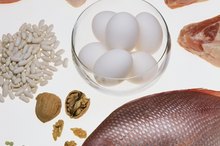What does fact checked mean?
At Healthfully, we strive to deliver objective content that is accurate and up-to-date. Our team periodically reviews articles in order to ensure content quality. The sources cited below consist of evidence from peer-reviewed journals, prominent medical organizations, academic associations, and government data.
The information contained on this site is for informational purposes only, and should not be used as a substitute for the advice of a professional health care provider. Please check with the appropriate physician regarding health questions and concerns. Although we strive to deliver accurate and up-to-date information, no guarantee to that effect is made.
Does Whey Protein Stunt Teen Growth?
Whey is a fast-digesting protein that derives from milk. A wide variety of foods include whey, and most of them target people who wish to enhance muscle growth through weightlifting. Although excessive weightlifting can pose potential dangers to the growth of teens, whey is not the cause of the problem.
Origins
Milk contains two main forms of protein: whey and casein 1. According to University of Connecticut associate professor Dr. Jeff Volek, approximately 20 percent of the protein in milk is whey protein, with casein making up the remaining 80 percent 1. The whey in powders on the shelves of nutrition centers is extracted during the process of turning milk to cheese. Whey protein digests extremely quickly, sometimes in as little as 45 minutes, making it an ideal post-workout protein. In comparison, casein protein can take as long as seven hours to digest.
- Milk contains two main forms of protein: whey and casein 1.
- Whey protein digests extremely quickly, sometimes in as little as 45 minutes, making it an ideal post-workout protein.
Misconceptions
L-Arginine for Teens
Learn More
According to the Mayo Clinic website, teens who do intense weightlifting sessions followed by a whey protein shake can have stunted growth, but the whey protein shake post-lifting has nothing to do with the stunted growth. As a teen, lifting weights too rigorously can damage muscles and tendons that have yet to develop, also known as growth plates. Drinking whey protein afterward merely increases the muscle growth efficiency post-workout.
Breast Milk
Whey protein isn't found solely in cow's milk. Breast milk contains high amounts of protein to assist with muscle development and, according to the American Pregnancy Association, 60 percent to 80 percent of that protein is whey-based. The whey protein in human breast milk not only assists with muscle development, but also contains infection-fighting nutrients.
Benefits
Colostrum & Weight Loss
Learn More
Whey protein provides teens with many benefits, none of which leads to stunted growth. Whey protein is a complete protein, which means that it contains all of the essential amino acids a teen needs in his daily diet. Whey contains high traces of the amino acid cysteine, which is a major catalyst in boosting the immune system. According to the American Cancer Society, women with high levels of cysteine were 56 percent less likely to develop breast cancer.
- Whey protein provides teens with many benefits, none of which leads to stunted growth.
- Whey contains high traces of the amino acid cysteine, which is a major catalyst in boosting the immune system.
Verdict
According to the U.S. Department of Agriculture, a teen's diet should contain approximately 0.4 grams of protein for every pound of body weight. Whey protein's quick-digesting, low-calorie, easy-to-mix properties make it an excellent addition to a teen's diet.
Related Articles
References
- Nutrition Express: Whey vs. Casein Protein
- Mayo Clinic: Strength Training: OK For Kids?
- UCLA Dining: Be A Protein Pro
- Boirie, Y., Dangin, M., Gachon, P., Vasson, M. P., Maubois, J. L., & Beaufrère, B. (1997). Slow and fast dietary proteins differently modulate postprandial protein accretion. Proceedings of the National Academy of Sciences, 94(26), 14930-14935.
- Anthony, J. C., Anthony, T. G., Kimball, S. R., & Jefferson, L. S. (2001). Signaling pathways involved in translational control of protein synthesis in skeletal muscle by leucine. The Journal of Nutrition, 131(3), 856S-860S.
- Cribb, P. J., Williams, A. D., Carey, M. F., & Hayes, A. (2006). The effect of whey isolate and resistance training on strength, body composition, and plasma glutamine. International Journal of Sport Nutrition and Exercise Metabolism, 16(5), 494-509.
- Baer, D. J., Stote, K. S., Paul, D. R., Harris, G. K., Rumpler, W. V., & Clevidence, B. A. (2011). Whey Protein but Not Soy Protein Supplementation Alters Body Weight and Composition in Free-Living Overweight and Obese Adults, 2. The Journal of Nutrition, 141(8), 1489-1494.
Writer Bio
Nicholas Bragg, a lifelong athlete and certified personal trainer, attended four separate colleges from Maryland to California, finishing in 2004. Named to the CEO's club as an elite performer at Intuit in 2009, he changed careers in 2010 and now contributes writing to Mahalo and SportswithM.









